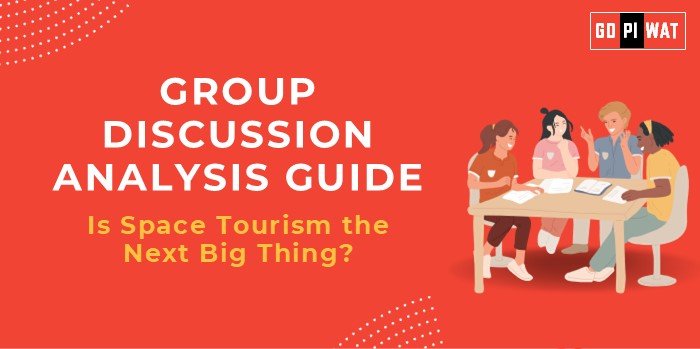🚀 Group Discussion Analysis Guide: Is Space Tourism the Next Big Thing?
🌌 Introduction to Space Tourism
- Opening Context: Space tourism, once a distant fantasy, is now approaching reality as private companies make rapid advancements. With pioneers like SpaceX, Blue Origin, and Virgin Galactic leading the charge, space tourism holds the potential to redefine travel and exploration.
- Background: Space tourism, initially introduced in the early 2000s with a few private flights, gained traction in recent years as companies developed technology to make commercial space flights viable. Virgin Galactic’s 2021 flight and SpaceX’s all-civilian crew in 2022 marked milestones for private space travel.
📊 Quick Facts and Key Statistics
💹 Projected Market Growth: The global space tourism market is expected to grow from $651 million in 2021 to over $8 billion by 2030, indicating high investor interest and public fascination.
🚀 Key Players: SpaceX, Virgin Galactic, Blue Origin are the leading companies offering space tourism services, with commercial flights already underway.
💸 Ticket Cost: Current prices range from $250,000 (Virgin Galactic) to $450,000 (SpaceX), targeting high-net-worth individuals initially.
🌍 Environmental Impact: Rocket launches are estimated to produce 5-10 times more CO2 per passenger than commercial flights, raising sustainability concerns.
👥 Stakeholders and Their Roles
- Private Companies (e.g., SpaceX, Blue Origin): Innovate and fund the technology needed to make space tourism feasible.
- Governments and Regulatory Bodies (e.g., NASA, FAA): Ensure safety and regulate launches, space traffic, and environmental impact.
- Consumers: Primarily wealthy individuals and space enthusiasts willing to pay for a once-in-a-lifetime experience.
- Environmental Groups: Raise awareness and push for sustainable practices to reduce carbon emissions from space tourism.
🏆 Achievements and Challenges
- Achievements:
- 🔬 Technological Breakthroughs: Reusable rockets by SpaceX have reduced costs significantly, making commercial flights more affordable.
- 🚀 Successful Flights: Virgin Galactic’s and Blue Origin’s successful flights have demonstrated the feasibility of sub-orbital tourism.
- 📈 Public Interest: Strong interest among the public and investors, with waiting lists for future flights.
- Challenges:
- 💰 Cost: Space tourism remains prohibitively expensive, limiting accessibility to a wealthy few.
- 🌍 Environmental Concerns: Carbon emissions and pollution from rocket launches could impact the environment adversely.
- ⚠️ Safety Risks: Space travel is inherently risky, and safety concerns remain high.
- Global Comparisons:
- 🇷🇺 Russia: Pioneered space tourism with early private space flights, setting a precedent for civilian travel.
- 🇺🇸 US: Leading in commercial space travel with active contributions from NASA and private sector collaboration.
🗨️ Structured Arguments for Discussion
- Supporting Stance: Space tourism is an emerging sector with enormous potential for scientific and economic growth, offering new frontiers for tourism.
- Opposing Stance: The high cost and environmental impact limit space tourism’s feasibility as a mainstream travel option.
- Balanced Perspective: While space tourism offers exciting possibilities, regulatory frameworks and environmental sustainability need careful consideration.
🔑 Effective Discussion Approaches
- Opening Approaches:
- 📊 Statistical Impact: “The space tourism market is expected to grow eightfold by 2030, with companies like SpaceX making it increasingly feasible.”
- 🚀 Technological Impact: “Space tourism demonstrates humanity’s advancement in technology, as reusable rockets make commercial space flights possible.”
- Counter-Argument Handling:
- Acknowledge high costs and risks, suggesting that early investment may drive down prices over time.
- Propose a gradual approach where the sector could start as a luxury market and expand as technology improves.
🧠 Strategic Analysis of Strengths and Weaknesses
- Strengths: Technological advances, high consumer interest, reusable rocket technology.
- Weaknesses: High costs, environmental concerns, regulatory challenges.
- Opportunities: Potential for future mass tourism, scientific research, economic growth in space tech.
- Threats: Potential for accidents, carbon emissions, public backlash on environmental grounds.
🎓 Connecting with B-School Applications
- Real-World Applications: The economics of emerging industries, consumer behavior analysis, and technological advancements.
- Sample Interview Questions:
- “How do you see the role of space tourism evolving in the next decade?”
- “What measures could the space tourism industry take to address environmental concerns?”
- Insights for B-School Students: Emerging markets, investment potential, sustainability, and ethical considerations in technology-driven industries.


